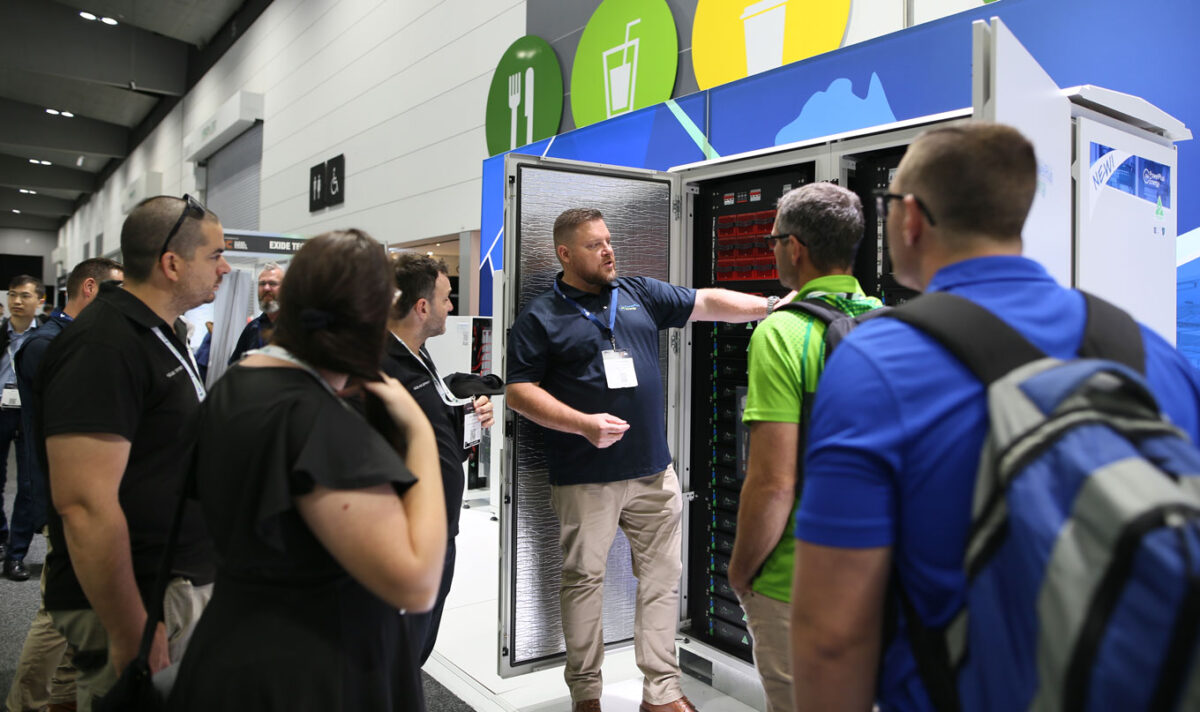While the red tape around the residential battery market is probably easier to navigate, the demand for larger-scale storage systems makes it an enticing market. This year, solar giant Jinko followed in the footsteps of Longi, moving towards providing utility-scale storage solutions. Australian battery companies, on the other hand, seem to more be catering to the commercial and industrial (C&I) segment, providing solutions for the telecommunications industry, as well as mining and farming.
Pv magazine Australia has outlined new entrants to Australia’s residential battery market here.
Australian companies
PowerPlus Energy
PowerPlus launched its ‘Escape’ battery storage system range at Melbourne’s All Energy event last October. PowerPlus’ Business Development Manager Nic Stone said those systems now meet all the CEC certification requirements. The battery range is largely targeted towards off-grid small commercial applications, though it could also be used for residential. The smallest ‘Escape 10’ option says its range goes from 7.4 – 15kW / 0 – 72kWh, while the largest battery system option reaches 1 MW / 2 MWh.
With this new range, Stone said the company has now taken responsibility for whole BESS system, whereas before PowerPlus just focussed on DC-battery storage, designing conversion equipment. The company’s team of 80 are mostly based in Victoria, and the company in March had a 33% stake acquired by PPK Group Limited for $1.8 million. Today, the company exports to New Zealand and other pacific countries, Stone said, and tries to source local materials – though, of course, there is no battery cell manufacturing done within Australia.
Solar Energy Australia
Previously focussed on inverters, the company has now pivoted towards storage. In November, it launched a storage system with 52 kWh of capacity, aimed at remote houses, farming and other small commercial operations. James Rutty, the company’s Business Development Manager, said the company’s storage solutions wholesale for around $0.62 per watt hour. The batteries are manufactured in Mount Kuringai and use Polarium battery cells. Solar Energy Australia belongs to the Powerbox Australia group.
Chinese companies
Hithium
Hithium focuses on stationary storage only, optimising its systems for particular applications in the C&I and utility-scale segments. Its products include a cabinet, aimed at the C&I segment, with a capacity of 399 kWh. Ten of these units go into its utility-scale container, which is 3.99 MWh. Alongside this, the company provides battery cells for residential battery makers – but doesn’t make any home batteries itself.
The company’s products stop at the DC-side, its representatives said, meaning they are classed as BESS (battery energy storage systems) rather than ESS (energy storage systems) products.
The Chinese brand, founded in 2019, has been in the US market for the last year, and says it has installed 5 GWh of storage to date – 90% of which has been in China, and the remaining 10% abroad. While the company is still relatively young, its representatives said its technology is built on a core patent that has been in development for far longer. That technology uses certain lithium compounds to decrease degradation.
Hithium’s representatives said the company is working with integrators for its cells, meaning its battery hardware and software is integrated into third party casings. Several lithium mining and refining companies have minority stake in Hithium, which its representatives said is part of the company’s strategy to secure its lithium supply.
Last December, Hithium and Australian solar developer Sun Valley HK Group signed an agreement on their intention to explore “various forms of cooperation” on eight solar farms either in the construction or planning stages. While few details were provided, the announcement referred to a total capacity of 200 MW / 400 MWh under construction and 400 MW / 800 MWh in planning.
Jevier
Australia is this Chinese company’s first target market in its global expansion. Its representatives said the company is aiming to set up a small team here in Australia, and is currently looking for a place to do so, as well as searching for distribution and installation partners.
In terms of its products, the company is targeting both the residential and utility segments. It’s C&I offering has a capacity of 22.5 kW/45 kWh. At the utility scale, it offers two containerised systems at 1.5 MWh or 3 MWh.
Jinko
One of Australia’s most popular solar brands, Jinko is moving into utility-scale battery storage with a 3.44 MWh containerised solution. The company has already quoted a few utility-scale projects in Australia, according to Leo Ye, Jinko Australia’s Regional Sales Manager. The company is currently in the process of delivering a 500 MWh storage project in Israel.
Jinko is also seeking to move into the industrial segment, with keen eyes on the growing market for community batteries, Ye told pv magazine Australia.
This content is protected by copyright and may not be reused. If you want to cooperate with us and would like to reuse some of our content, please contact: editors@pv-magazine.com.









By submitting this form you agree to pv magazine using your data for the purposes of publishing your comment.
Your personal data will only be disclosed or otherwise transmitted to third parties for the purposes of spam filtering or if this is necessary for technical maintenance of the website. Any other transfer to third parties will not take place unless this is justified on the basis of applicable data protection regulations or if pv magazine is legally obliged to do so.
You may revoke this consent at any time with effect for the future, in which case your personal data will be deleted immediately. Otherwise, your data will be deleted if pv magazine has processed your request or the purpose of data storage is fulfilled.
Further information on data privacy can be found in our Data Protection Policy.